| Listing 1 - 10 of 21 | << page >> |
Sort by
|
Book
ISBN: 3540164936 Year: 1986 Publisher: Berlin Springer
Abstract | Keywords | Export | Availability | Bookmark
 Loading...
Loading...Choose an application
- Reference Manager
- EndNote
- RefWorks (Direct export to RefWorks)
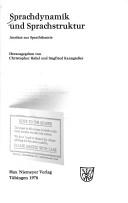
ISBN: 3484220252 3110944456 Year: 1978 Publisher: Tübingen Niemeyer
Abstract | Keywords | Export | Availability | Bookmark
 Loading...
Loading...Choose an application
- Reference Manager
- EndNote
- RefWorks (Direct export to RefWorks)
Linguistics --- Linguistics. --- Linguistic science --- Science of language --- Language and languages
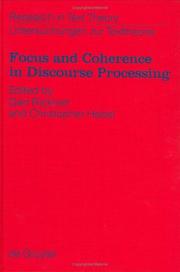
ISBN: 3110808412 9783110808414 3110144662 9783110144666 Year: 1995 Publisher: Berlin De Gruyter
Abstract | Keywords | Export | Availability | Bookmark
 Loading...
Loading...Choose an application
- Reference Manager
- EndNote
- RefWorks (Direct export to RefWorks)
No detailed description available for "Focus and Coherence in Discourse Processing".
Discourse analysis --- Focus (Linguistics) --- Cohesion (Linguistics) --- Cognitive science. --- Science --- Philosophy of mind --- Grammar, Comparative and general --- Coherence (Linguistics) --- Cohesiveness (Linguistics) --- Linguistics --- Psychological aspects. --- Topic and comment --- Pragmatics --- Psycholinguistics
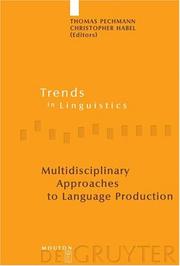
ISBN: 3110894025 9783110894028 3110178400 9783110178401 Year: 2004 Volume: 157 Publisher: Berlin Hawthorne, N.Y. Mouton de Gruyter
Abstract | Keywords | Export | Availability | Bookmark
 Loading...
Loading...Choose an application
- Reference Manager
- EndNote
- RefWorks (Direct export to RefWorks)
This volume comprises contributions from different disciplines (cognitive psychology, linguistics, computer science, neuroscience) concerned with the generation of natural speech. It summarizes the outcome of a six-year long priority program funded by the German Research Foundation (DFG) that aimed at bringing together colleagues with different viewpoints but sharing a principal interest in the cognitive processes underlying language production. The result is a state-of-the-art discussion of one of the most fascinating branches of human behavior taking into account a particularly rich multidis
Psycholinguistics. --- Linguistics. --- Linguistic science --- Science of language --- Language and languages --- Language, Psychology of --- Psychology of language --- Speech --- Linguistics --- Psychology --- Thought and thinking --- Psychological aspects --- Psycholinguistics --- Psycholinguistique
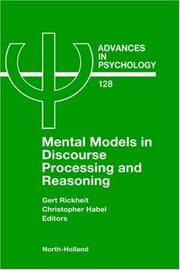
ISBN: 0444502742 9780444502742 9780080536224 0080536220 9786611050030 1281050032 Year: 1999 Publisher: Amsterdam New York North-Holland
Abstract | Keywords | Export | Availability | Bookmark
 Loading...
Loading...Choose an application
- Reference Manager
- EndNote
- RefWorks (Direct export to RefWorks)
In this interdisciplinary discussion on mental models, researchers from various areas in cognitive science tackle the following questions: What is a mental model? What are the prospects and limitations in applying the mental model notion in cognitive science? How can the ideas on the nature of mental models and their mode of operation be empirically substantiated? The primary goal of the research group was to work out a definition of mental models that embraces the overall use of this construct in cognitive science as well as the more specific conceptions used in particular research domains su
Pragmatics --- Psycholinguistics --- Discourse analysis --- Reasoning. --- Psychological aspects. --- Reasoning --- #PBIB:2000.2 --- Argumentation --- Ratiocination --- Reason --- Thought and thinking --- Judgment (Logic) --- Logic --- Psychological aspects
Book
Abstract | Keywords | Export | Availability | Bookmark
 Loading...
Loading...Choose an application
- Reference Manager
- EndNote
- RefWorks (Direct export to RefWorks)

ISBN: 0444502742 9780444502742 9780080536224 0080536220 Publisher: Amsterdam North-Holland
Abstract | Keywords | Export | Availability | Bookmark
 Loading...
Loading...Choose an application
- Reference Manager
- EndNote
- RefWorks (Direct export to RefWorks)
In this interdisciplinary discussion on mental models, researchers from various areas in cognitive science tackle the following questions: What is a mental model? What are the prospects and limitations in applying the mental model notion in cognitive science? How can the ideas on the nature of mental models and their mode of operation be empirically substantiated? The primary goal of the research group was to work out a definition of mental models that embraces the overall use of this construct in cognitive science as well as the more specific conceptions used in particular research domains such as cognitive linguistics. Theoretical claims about the properties of mental models were discussed and their tenability evaluated against the empirical evidence. The volume is divided into three parts. Fundamental aspects of mental models are presented in the first section, the following part contains contributions to the function of mental models in discourse processing, and finally problems of mental models in reasoning and problem solving are outlined.
Book
Abstract | Keywords | Export | Availability | Bookmark
 Loading...
Loading...Choose an application
- Reference Manager
- EndNote
- RefWorks (Direct export to RefWorks)
Book
Abstract | Keywords | Export | Availability | Bookmark
 Loading...
Loading...Choose an application
- Reference Manager
- EndNote
- RefWorks (Direct export to RefWorks)
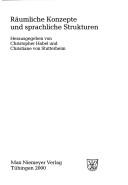
ISBN: 3484304170 3111855791 3110952165 Year: 2000 Volume: 417 Publisher: Tübingen Niemeyer
Abstract | Keywords | Export | Availability | Bookmark
 Loading...
Loading...Choose an application
- Reference Manager
- EndNote
- RefWorks (Direct export to RefWorks)
For an interdisciplinary approach to linguistics spatial concepts are of especial significance in that they represent a link between linguistic and extra-linguistic cognition. In language production spatial representations form the starting-point for a class of linearization processes; vice versa, in language reception we have delinearization processes building up mental spatial representations from linguistic structures. Such processes are subject to restrictions specific to individual languages and resting on the respective relations between the language system and the conceptual system of spatial categories and relations. Räumliche Konzepte sind für eine interdisziplinär orientierte Linguistik von besonderer Bedeutung, da sie ein Bindeglied zwischen sprachlicher und außersprachlicher Kognition darstellen. Räumliche Repräsentationen bilden in der Sprachproduktion den Ausgangspunkt für eine Klasse von Linearisierungsprozessen; dual hierzu existieren in der Sprachrezeption Delinearisierungsprozesse, die aus sprachlichen Strukturen mentale räumliche Repräsenationen aufbauen. Derartige Prozesse unterliegen einzelsprachlichen Beschränkungen, die auf spezifischen Beziehungen zwischen dem sprachlichen System und dem konzeptuellen System räumlicher Kategorien und Relationen beruhen.
Psycholinguistics --- Grammar --- Espace et temps dans la langue --- Espace et temps dans le langage --- Expression de l'espace et du temps (Linguistique) --- Langage -- Expression de l'espace et du temps --- Ruimte en tijd in de taal --- Space and time in language --- Temps et espace dans le langage --- 800:159.9 --- 800:316 --- Grammar, Comparative and general --- Language and languages --- Comparative grammar --- Grammar, Philosophical --- Grammar, Universal --- Philosophical grammar --- Linguistics --- Philology --- Taalwetenschap. Taalkunde. Linguistiek-:-Psychologie: zie ook: Psychiatrie: n-{616.89-008} en n-{615.851} --- Sociolinguistiek --- Grammar, Comparative --- Grammar, Comparative and general. --- Space and time in language. --- 800:316 Sociolinguistiek --- 800:159.9 Taalwetenschap. Taalkunde. Linguistiek-:-Psychologie: zie ook: Psychiatrie: n-{616.89-008} en n-{615.851}
| Listing 1 - 10 of 21 | << page >> |
Sort by
|

 Search
Search Feedback
Feedback About UniCat
About UniCat  Help
Help News
News